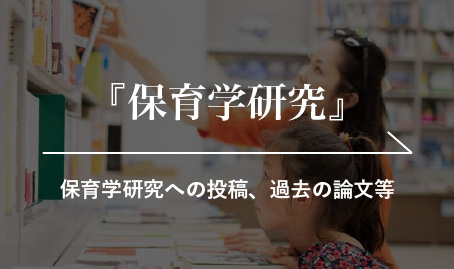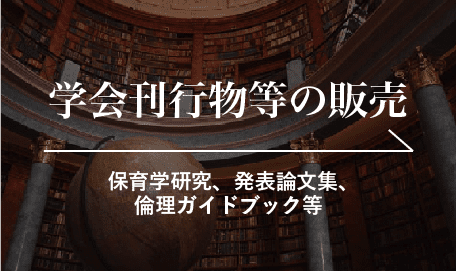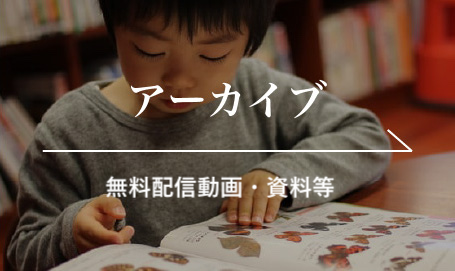< VOLUME 56, No.3>
Hiroshi Hatakeyama Understanding of the Situation by the Frame of the
Teacher
in the Free Play Scene and the
Relation to Children
Research on Early Childhood
Care and Education in Japan, 2018, 56(3), 9-20.
The purpose of this research
is to clarify what kind of frame the preschool teacher uses to understand the child’s
behavior and correspond to the child in free play. Relationship with the
children of three preschool teachers in free play was recorded on video. Then,
a semi – structured interview was held with the preschool teacher. As a result,
the following three points were shown.
(1) The teacher constituted
the problem from the situation with the frame, the teacher then responded to
solve the problem.
(2) The teacher constituted
multiple problems from one situation with multiple frames.
(3) The teacher’s frame was
influenced by expectations and wishes based on the children’s understanding and
developmental view.
Key Word:frame, constitution of the problem, preschool teacher
< VOLUME 56, No.3>
Matsuka Koga Quality of Childcare for One-Year-Olds and Children’s Conflict
Research on Early Childhood
Care and Education in Japan, 2018, 56(3), 21-32.
This study examines how operational quality of childcare for one-year-old children is associated with conflicts such as physically aggressive behaviors. A questionnaire on operational quality and childcare schedules was ad- ministrated to all authorized nursery centers in Z prefecture.
Conflicts increase when children arrive at nursery centers and leave for home, and activity time is around 10AM. The number of children per nursery teacher during the month of April and the type of free play activity also affected incidents. Conflicts increased when nursery teachers left to assist children at toilets. It is effective to delay shift changes at peak times when children arrive and leave during the first half of the year. It is important to improve teacher-child ratios to enable children to do independent activities and receive attentive support.
Key Word:quality of
childcare, operational quality, childcare for one-year-old, childcare schedule,
conflict of children
< VOLUME 56, No.3>
Tokushi Okura How Does Alternation of
Childcare Providers Affect Childcare Quality and Children?
Research on Early Childhood
Care and Education in Japan, 2018, 56(3), 33-44.
Japan currently promotes the marketization of early childhood education
and care (ECEC) to meet increas- ing demand, and some local governments are
rapidly privatizing public childcare centers. Consequently, childcare centers
consigned to corporations providing services at lower cost are increasing. How
does such alternation of providers affect childcare quality and children
separated from familiar caregivers? This case study describes de- clining
quality of childcare services in a public hospital outsourced to private
enterprise, demonstrating that it negatively influences children’s emotional
stability. This paper concludes that childcare quality assurance requires the
extension of contract periods; the regulation of the price of outsourcing; the
clarification of new and previous providers’ obligations; and improvement of
caregivers’ wages.
Key Word:quality of childcare, alternation of providers, structural
quality, attachment, case study
< VOLUME 56, No.3>
Minako Masuyama The Impact of Wage Levels on
Nursery Teacher Shortages:Focus on Policy Trends in Japan and Previous Research
in the U.S. and the U.K.
Research on Early Childhood
Care and Education in Japan, 2018, 56(3), 45-55.
This paper aims to analyze to
what degree wage levels cause nursery teachers shortages focusing on government
policy trends in Japan and previous research in the U.S. and the U.K. Recently,
the Japanese government has promoted the unification of kindergartens and
nursery schools, and their staff/teacher qualifications have been
interchangeable under special measures. In this paper, the analysis of national
wage survey suggests that the wage level of nursery teach- ers is lower than
that of kindergarten teachers and several other medical or social welfare
professionals, while nursery teachers’ educational levels have increased during
the past 30 years. Finally, this paper refers to the importance of re- search
accumulation regarding the relationship between the quality of nursery schools
and their teachers’ wage levels.
Key Word:unification of kindergartens and nursery schools, nursery
teacher shortages, wages of nursery teachers, quality of ECCE, Laspeyres index
< VOLUME 56, No.3>
Makiko Obi An Attempt of “New Early
Childhood Education” at the Kindergarten Attached to Chiba Normal School after
the Enactment of the School Education Law
Research on Early Childhood
Care and Education in Japan, 2018, 56(3), 58-69.
This study aimed to identify the characteristics of the “New Early
Childhood Education (1947),” developed and practiced at the Kindergarten
attached to Chiba Normal School, after the enactment of the School Educa- tion
Law, based on the available practical materials. The results highlighted the
following three characteristic aspects of the “New Early Childhood Education”:
a focus on and embodiment of “appropriate environments” provided in the School
Education Law; the structure of daily lives based on the voluntary activities
of children, induced in relation to environments; and the adoption of care and
education forms that ensure adequate develop- ment of children’s voluntary
activities and reconstruction of the “guiding child care theory,” attempted at
the kin- dergarten since before the war.
Key Word:Kindergarten Attached to Chiba Normal School, “New Early Childhood Education”, “Appropriate Environments”, Yudo-Hoiku (guiding child care theory), care and education forms.
< VOLUME 56, No.3>
Tomo Nomura A Traced History and
Contemporary Problems of Childcare Studies on “Children Concerned”
Research on Early Childhood
Care and Education in Japan, 2018, 56(3), 70-80.
Making a summary of historical changes in the studies of child care and
education with “children concerned” which means “children in need of some
special attention”, this study is trying to research the contemporary prob-
lems in this field. In the postwar period, these children and handicapped ones
had been regarded as “problem children”. With the institutionalization of care
and education for handicapped children, however, some children without any
handicaps have been marked as “children concerned”. In cooperation with the
policy for promoting the education of handicapped children, the studies on
these “children concerned” in relation to developmental disorders have markedly
increased in number. This study indicates the necessity of creating group child
care and education including “children concerned” to make development by
themselves all together.
Key Word:children concerned, inclusive care and education for the
children, group setting, developing individual
< VOLUME 56, No.3>
Yasunori Kashiwagi The Early Childhood Education
of Jürgen Moysich before Babyklappe: Anti-Authoritarian Education and Education
after Auschwitz in Germany
Research on Early Childhood
Care and Education in Japan, 2018, 56(3), 81-91.
This study aims to analyze
Jürgen Moysich’s thoughts and his practices before his idea of Babyklappe (baby
box) in 1999 and to describe the dynamism of his thought related to the early
childhood education in Germany. His main works are published exclusively in the
nineties, those contexts belong to seventies and eighties pedagogy in Germany,
especially “progressive education” and “anti-authoritarian education”. However,
in the nineties he was interested in the issue of “education after Auschwitz”
put forward by Theodor W. Adorno and had radically car- ried out his own early
child care and education. The results suggest that there is a concept of
anti-authoritarian pedagogical mediation coherently in the heart of his
thought, and that his idea of Babyklappe should be inter- preted in this
context.
Key Word:Babyklappe, SterniPark, anti-authoritarian education,
education after Auschwitz, pedagogical mediation.
< VOLUME 56, No.3>
Aiichiro Sakai A Preschool Teacher’s
Perception of School Buses and their Potential as an Early Childhood Care and
Education Environment
Research on Early Childhood
Care and Education in Japan, 2018, 56(3), 92-102.
The purpose of this research is to clarify the teacher’s perception of the
work on the school bus and the behav- ior of the children that ride the school
bus through an interview of the preschool teacher as a rider on the school bus.
Additionally, the characteristics of the school bus as an early childhood care
and educational environment will be considered. Through the qualitative
analysis of the interview data, various considerations of teachers con- cerning
the rewards and/or dissatisfaction regarding their work were revealed.
Additionally, it was learned that on school buses, children shared their
experiences from their classes and homes, resulting in relationships called
“bus groups.” In these groups, children shared their customs and cultures with
peers of different ages. However, teach- ers do not necessarily recognize
school buses as ECCE environments.
Key Word:school bus, teacher’s perception, school buses as ECCE environments
< VOLUME 56, No.3>
Yumi Yodogawa 5-6-Year-Olds’ Perception of
their Mealtime Experience in ECEC Settings: Analysis of Drawings and Interviews
of Children
Research on Early Childhood
Care and Education in Japan, 2018, 56(3), 103-114.
This study aimed to clarify how 5-6-year-old children perceive their
mealtimes at their ECEC institutions. 36 children from three institutions
participated in this study. Each pair of children were asked to draw their
meal- time experience while being interviewed. The content of their drawings
were: 1) detail of meal; 2) meal place en- vironment; 3) procedure of mealtime;
and 4) their friends. The analysis showed that children, from the institutions
where they have school lunch and decide by themselves how much they eat, drew
rice, main, side dishes, and soup, which indicates that they recognized clearly
what they had eaten. Also the children who participate in preparing meals and
tidying up, understood well the procedures of mealtimes. It was suggested that
children who show little interest in meals did not produce many drawings needed
some support for eating.
Key Word:children’s perception, drawings,
children’s autonomy, interest in
mealtimes
< VOLUME 56, No.3>
Chizuko Tatemoto Basic Research into Infants’
Changes in Heart Rates at the Time of Hearing their Mothers’ Heart
Beats:Possibility of Childcare Practice from a Viewpoint of Sense of Security
Research on Early Childhood
Care and Education in Japan, 2018, 56(3), 115-125.
The purpose of this research was to clarify by heart rate how infants
respond to their mothers’ heart beats by focusing on a sense of security. I
measured a heart rate of 33 infants from 38.0 months to 74.0 months through
hearing activity, hearing silence, mothers’ heart beats sounds, and a music box
sound. As a result, it was revealed that the mothers’ heart beat sound,
especially reduce the heart rate below the other sounds (silence or the music
box). In this case, it was remarkable that hearing mothers’ heart beats,
especially decreased heart rates rather than silence. From the above results, I
considered the effectiveness of mothers’ heart beats in infants’ places of
devel- opment and showed the possibility of childcare practice.
Key Word:mothers’ heart beat sounds, hearing ,
infants, sense of security, heart rate
< VOLUME 56, No.3>
Hisami Haraguchi and Takashi
Otani Collaboration with Psychological Professions from Nursery
Teachers’ Perspectives: Focusing on Changes in Childcare Experiences and their
Relationships
Research on Early Childhood
Care and Education in Japan, 2018, 56(3), 126-136.
This study aims to clarify collaboration with psychological professions
from nursery teachers’ perspectives. The authors interviewed 6 nursery teachers
that had different amounts of experience. Qualitative data was analyzed using
Steps for Coding and Theorization.
As a result, different perspectives for psychological professions were
indicated by years of experience. Novice teachers perceived the psychological
profession as a “teacher” who teaches psychology in school. As they experi-
enced collaboration with psychological professions, collaboration was done
closely. Experienced teachers internal- ized the viewpoint of psychological
professions and understood children closely psychologically. In conclusion,
nursery teachers’ changes of perspectives for psychological professions were
shown. Better collaboration was dis- cussed.
Key Word:nursery teachers, psychological professions, collaboration,
difference of expertise, Steps for Coding and Theorization
< VOLUME 56, No.3>
Miki Yuzawa , Harutomo Ueda ,
Keita Irie and Tomoyo Katahira A Description of the Learning
Process through Four Years at a Nursery School and Kindergarten Teachers’
Training Course: How Did Students Learn to
be Narrators about Episodes
Research on Early Childhood
Care and Education in Japan, 2018, 56(3), 137-148.
This study described learning processes until the students became
narrators of episodes through four years at a nursery school and kindergarten
teacher training course. In study one, four fourth-year university students
talked about episodes concerning early childhood care and education. Findings
are as follows: 1) In the first year, they learned the episodes from university
teachers; 2) In the second year, they felt it difficult to find episodes while
watching children at nursery school and kindergarten; 3) In the third year,
they began to understand how they should capture episodes; 4) In the fourth
year, they became narrators about episodes by professional points of view.
These results are supported by reviewing the portfolios of the students and
questionnaires about episodes for 270 students in Study two.
Key Word:professional development, episode, university students,
nursery school and kindergarten teacher training
< VOLUME 56, No.3>
Maki Eto Experiences that New
Preschool Teachers Build with Parents:A Focus on Narrative Transformation
Process about Difficulty Communicating with Parents
Research on Early Childhood
Care and Education in Japan, 2018, 56(3), 149-160.
This research assessed narratives to examine the transformation process of
new preschool teachers building re- lationships with parents. Two private
preschool teachers with one year of experience were included. The data were
analyzed using M-GTA. Upon examining the relationship transformation process
among new preschool teachers, the following considerations were raised: 1) New
teachers’ comments regarding relationships with parents could be divided into three periods: when teachers
did not know what to say, when teachers did not know how to reply, and when
two-way conversations were attained; 2) The presence of other teachers allowed
new teachers to receive support in dealing with parents, but it also led new
teachers to have feelings of inexperience and inadequacy; and 3) New teachers’
narratives to parents changed depending on the age of children.
Key Word:new preschool teachers, parents, difficult experiences,
building relationships, narrative transfor- mation process
< VOLUME 56, No.3>
Yoshimi Takahata, Tomoko Nasukawa
and Kumiko Isono Parental Support and Transformation in the Intersubjectivity
in Play of Children up to Two Years Old: Episodes in the Childcare Support Room
Research on Early Childhood
Care and Education in Japan, 2018, 56(3), 161-173.
This study examines intersubjectivity in play among children up to two
years old and its relationship with parental support. An analysis of 155
reports using the KH Coder software confirms that intersubjectivity in play
changes according to the interest of the subjects as well as their age and
their acquisition of physical movement. Analysis of the co-occurrence network
clearly shows the parents’ relationships with children’ play changes with the
age of the child. Parental support changes when seeing the child is immersed in
his/her favorite play. This result suggests suitable childcare support room
methods for children and parents.
Key Word:Children up to two year olds, intersubjectivity play, parents’ relationship, childcare support, KH Coder
< VOLUME 56, No.3>
Wanchien Huang, Yuko Yamana, Tomomi Sakakibara and Mika Wada Children’s Language Use in a Multicultural Kindergarten: Focusing on 5-Year-Olds’ Code Switching
Research on Early Childhood Care and Education in Japan, 2018, 56(3), 174-185.
This study aims to find how the children who grow up in a multicultural environment communicate with other people surrounding themselves during the new-language-learning process, and to clarify the situations when children switch between languages, especially under what circumstances and how often the children interact with others in different languages in multicultural kindergartens.
We observed eight children who were playing in a Chinese language kindergarten in Japan. The results showed that the Chinese-Japanese bilingual children usually take a more proactive stance on language switching rather than passive responding. Furthermore, they managed to switch to their dominant language when they didn’t know an appropriate word in the other language in the kindergarten. The results that have been indicated by adult speakers in related research are confirmed in our study.
Key Word:code-switching,
multicultural kindergarten, everyday conversations









